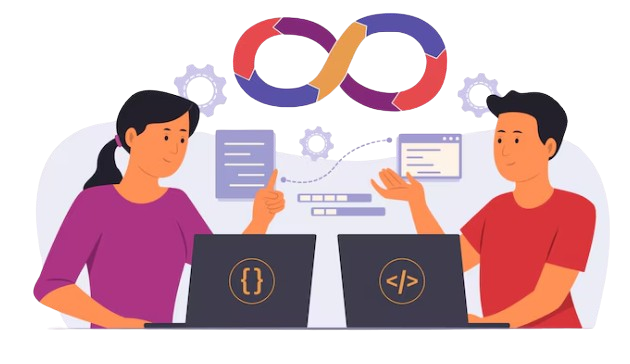The perfect partnership between DevOps and Agile has transformed the software development landscape, enabling organizations to deliver high-quality software quickly, efficiently, and reliably. By enhancing collaboration, accelerating time-to-market, and improving customer satisfaction, this powerful combination drives success in the competitive digital age.
In the fast-paced world of software development, speed, efficiency, and flexibility are key to staying ahead of the competition. Two methodologies that have become essential in achieving these goals are DevOps and Agile. Both have revolutionized the way software is developed, tested, and deployed, and together, they form a perfect partnership that enhances the overall software development lifecycle. In this blog post, we’ll explore the synergy between DevOps and Agile, their benefits, and how they complement each other to drive success.
Understanding DevOps and Agile
-
What is DevOps?
DevOps is a cultural and operational approach that emphasizes collaboration, communication, and integration between software developers and IT operations teams. Its primary goal is to shorten the software development lifecycle, deliver continuous updates, and improve the reliability and quality of software products. DevOps achieves this through automation, continuous integration and delivery (CI/CD), and monitoring.
-
What is Agile?
Conversely, Agile is a set of principles and practices for iterative and incremental software development. Agile methodologies, such as Scrum and Kanban, focus on flexibility, customer collaboration, and rapid delivery of small, functional pieces of software. Agile promotes adaptive planning, evolutionary development, and early delivery, enabling teams to respond to changing requirements and customer feedback quickly.

The Synergy Between DevOps and Agile
-
Enhancing Collaboration and Communication
One of the most significant benefits of integrating DevOps and Agile is the enhancement of collaboration and communication. Agile teams work closely with stakeholders to gather feedback and make adjustments, while DevOps fosters a culture of collaboration between development and operations teams. Together, they create a seamless flow of information and collaboration across all stages of the software development lifecycle.
-
Continuous Delivery and Iteration
Agile’s iterative approach aligns perfectly with DevOps’ focus on continuous delivery. Agile teams work in short sprints, delivering small increments of functional software, which DevOps teams can then deploy and monitor continuously. This continuous delivery model ensures that new features and updates reach customers faster and more reliably.
-
Accelerating Time-to-Market
By combining DevOps and Agile, organizations can significantly accelerate their time-to-market. Agile’s iterative development allows for rapid prototyping and testing, while DevOps’ automation and CI/CD pipelines streamline the deployment process. This synergy enables teams to release new features and updates quickly, responding to market demands and customer needs in real-time.
Key Benefits of DevOps and Agile Partnership
-
Improved Quality and Reliability
The DevOps and Agile partnership leads to improved software quality and reliability. Agile’s focus on continuous testing and feedback helps identify and address issues early in the development process. DevOps’ automation and monitoring tools further enhance quality by ensuring that code is consistently tested, integrated, and deployed without human error.
-
Increased Efficiency and Productivity
The integration of DevOps and Agile drives efficiency and productivity. Agile’s iterative approach breaks down complex projects into manageable tasks, while DevOps’ automation reduces manual efforts. This combination allows teams to work more efficiently, allocate resources effectively, and focus on innovation rather than repetitive tasks.
-
Enhanced Customer Satisfaction
Agile’s customer-centric approach, combined with DevOps’ ability to deliver continuous updates, results in enhanced customer satisfaction. Agile teams prioritize customer feedback and make adjustments accordingly, while DevOps ensures that these changes are deployed quickly and reliably. This iterative cycle of development and delivery keeps customers engaged and satisfied with the product.
Implementing DevOps and Agile Together
-
Establishing a Collaborative Culture
To successfully implement DevOps and Agile, organizations must establish a collaborative culture. This involves breaking down silos between development and operations teams and fostering a culture of open communication, shared responsibilities, and mutual respect. Regular cross-functional meetings and collaborative tools can facilitate this cultural shift.
-
Leveraging Automation and CI/CD
Automation and CI/CD are critical components of this partnership. Organizations should invest in automation tools that streamline the development, testing, and deployment processes. CI/CD pipelines ensure that code changes are automatically tested and deployed, reducing the risk of errors and accelerating the release cycle.
-
Embracing Continuous Improvement
Continuous improvement is at the heart of both. Organizations should regularly review their processes, gather feedback, and make adjustments to enhance efficiency and effectiveness. Retrospectives, performance metrics, and feedback loops can help identify areas for improvement and drive continuous growth.
Conclusion
The perfect partnership between DevOps and Agile has transformed the software development landscape, enabling organizations to deliver high-quality software quickly, efficiently, and reliably. By enhancing collaboration, accelerating time-to-market, and improving customer satisfaction, this powerful combination drives success in the competitive digital age.
Tanbits, which offers DevOps services, can help organizations implement and optimize their DevOps and Agile processes for maximum impact.
As technology continues to evolve, the integration of both will remain a cornerstone of successful software development, ensuring that organizations can adapt to changing market demands and deliver exceptional products to their customers. Embracing this partnership is not just a trend but a strategic move towards achieving sustainable growth and innovation.
BACK










